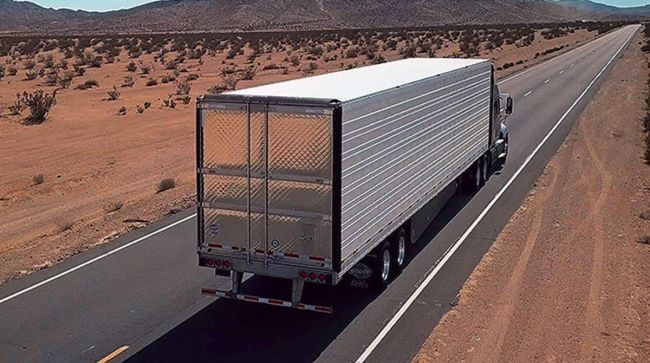Every month this year has experienced a year-over-year decline since closing out 2022 at the second-highest level on record. (Utillty Trailer Manufacturing Co.)
U.S. trailer orders continued the trend of year-over-year declines in July despite experiencing a significant sequential turnaround, according to ACT Research.
Preliminary data shows orders decreased 41.1% year-over-year to 10,000 from 16,997, ACT reported. But orders jumped by 58.7% sequentially compared with the prior month’s preliminary total of 6,300 units. Every month has experienced a year-over-year decline since closing out 2022 at the second-highest level on record.
“With still-high backlogs and 2024 order boards only minimally open, it is still too soon for robust expectations,” said Jennifer McNealy, director of commercial vehicle market research and publications at ACT Research. “July’s preliminary data show cancellations, although still higher than desired, moderated after three months of broadly based elevated cancellations.”
McNealy pointed out that backlogs fell below year-ago levels for the first time this year during June. She expects finalized data for the month to show the trailer backlog decreased by around 14,800 units in July.
[August State of the Industry: U.S. Trailer Preliminary Update] – Preliminary net trailer orders rise as ’24 books begin to open.
Get the update – https://t.co/V0aTXTdY9D#Trailers, #Transportation, #truck, #trucking, #ACT, #ACTResearch
— ACT Research (@actresearch) August 16, 2023
“We don’t expect any order activity to occur until we open up our quoting in the next week,” said Chris Hammond, executive vice president of sales at Great Dane. “We are booked for 2023 and any cancellations that we would expect have already occurred over the past few months. I suspect we’ll see a bump in August orders and then see strong orders in September and October.”
Transport Enterprise Leasing is a truck and trailer leasing company based in Chattanooga, Tenn. The company didn’t see much change in their operations compared to the prior month, with carriers split on how they are approaching trailer purchases.
“The private fleets, so shippers, manufacturers, distributors, retailers, wholesalers, we’re seeing a lot more movement on that front as far as they’re putting together their equipment needs for the fourth quarter of this year,” said Brandon Lairsen, vice president of trailer leasing at Transport Enterprise Leasing. “The trucking companies, the for-hire carriers, it is a completely mixed bag.”
Lairsen added some carriers are parking equipment because they’re unsure what the rest of this year is going to look, like while others are still looking at adding equipment. He believes the more uncertain carriers rely heavily on the spot market.
“There’s a lot of companies that specialized in one thing, whether it’s refrigerated freight or dry van only or flatbed, and you start to see some of these companies dipping their toe in the water of something else,” Lairsen said. “So refrigerated carriers that don’t ever haul dry freight are dipping their toe in the water of maybe we can capitalize on some of this shift and get some dry van freight to augment our reefer fleet and vice versa.”
Private fleets or those that have dedicated contracts tend to have a more positive outlook and are looking at adding equipment, Lairsen noted.

Giesen
“It was the typical slow summer month, kind of followed what we saw in June,” said David Giesen, vice president of sales at Stoughton Trailers. “The larger fleets are still pretty robust in their demand for next year. The smaller fleets are still slow. They’re waiting for freight volumes and freight rates to pick up.”
Yellow Corp. declaring bankruptcy could free up freight for other less-than-truckload players. Giesen is anticipating that outcome but doesn’t expect its trailers entering the market are going to make much difference overall since its fleet was older compared to other carriers.
“Hyundai Translead has effectively closed van sales for the 2023 calendar year and has been actively shifting its focus to 2024,” said Hyundai Translead CEO Sean Kenney. “Fleet and dealer feedback so far demonstrates a mixed feeling around the operating environment next year with some desiring to delay planning and others anxious to place orders in anticipation of the year.”
Kenney added that higher interest rates and low transportation rates are having an impact on the dealer business. He has heard feedback from dealers about a slower market for stock products, with multiple being supplied at numbers not seen since before 2019.
“Our market hasn’t really changed much in the past year,” said Dan Taylor, sales manager at Western Trailer. “We’re still running with a large backlog. Our backlog is running, depending on which line we talk about, from nine to 12 months out. So, we’re still chewing through a big backlog. But order volume coming in is down maybe 10% over last year. Not bad, all things considered in the market. I think, really, for a seasonal July, it’s not really far off from where we’ve been in the past. July is usually not the world’s greatest month in the trailer business.”






